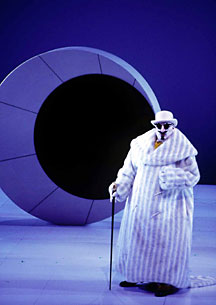L'Étoile or the Demands of Comic Music by Pierre Marc Bellemare
/ December 12, 2005
Version française...
 Although
recognized at once as a masterpiece by aficionados, L'Étoile, the
three-act comic opera by Emmanuel Chabrier (1841-1894), is largely unknown by
the general public. Only since 1984, with the appearance of the Gardiner
complete version, has it begun to find a marginal place in opera repertoires
almost everywhere. Although
recognized at once as a masterpiece by aficionados, L'Étoile, the
three-act comic opera by Emmanuel Chabrier (1841-1894), is largely unknown by
the general public. Only since 1984, with the appearance of the Gardiner
complete version, has it begun to find a marginal place in opera repertoires
almost everywhere.
L'Étoile is deservedly recognized as one of
the great comic operas, but one wonders why it took so long to gain a certain
renown among music-lovers, given that opera fans enjoy being entertained.
Perhaps as a genre, truly comical music isn't an easy thing . . .
When an opera amuses the audience, it's usually
because of something other than the music itself--the drama, perhaps, or the
acting, scenery, costumes, direction or, of course, the libretto. But music by
itself is generally not enough to get people laughing. And the talent for
writing comic music isn't given to everyone, not even geniuses.
Rossini was one of the rare composers to make a mark
in this field. Offenbach was another. Chabrier followed in the latter's
tradition, but the "Mozart of the Champs Élysées" (unlike Mozart himself) had a
real knack for writing funny music, whereas Chabrier's comic arias were usually
less robust and their charm not so immediately felt.
On the other hand, where Chabrier beats Offenbach and
almost everyone else is in his gift for enticing droll effects from various
elements of the musical language, making the score of L'Étoile an
uninterrupted succession of musical jokes. He has a range of tricks to tickle
the listener's funny-bone: the unexpected turn of a musical phrase, laughable
contrasts between the libretto and the music, a childlike joy in transforming
sounds and even words into something ridiculous, and so on. But where Chabrier
reveals his mastery (and where he would be a mentor to Strauss, among others)
is in his playful and inspired use of countless resources within the
orchestration, particularly for woodwinds.
It's difficult to imagine the dismay of the audience
at the operetta's première in 1877, given at the Bouffes (Offenbach's
theatre!). The public was used to carefully orchestrated but simple musical
accompaniments. The work had about forty performances then was taken off the
program. It languished in the purgatory of little-known compositions until our
own day, when efforts were made to revive it.
Will Montreal audiences be more indulgent? We hope so!
After all, in order to appreciate this music all you have to do is open your
ears . . . *
[Translated by Jane
Brierley]
photos: L'Étoile, stage direction by Mark Lamos,
Glimmerglass Opera 2001, credit: George Mott
Opéra de Montréal
les 5, 9, 12, 14 et 17 novembre 2005 à 20 h
L'Étoile d'Emmanuel Chabrier
Michèle Losier (Lazuli), Frédéric Antoun (Le roi Ouf
1er), Marie-Josée Lord (Laoula), Monique Pagé (Aloès), Phillip Addis (Tapioca),
Orchestre Métropolitain du Grand Montréal et Chœur de l'Opéra de Montréal
direction de Jean-Marie Zeitouni.
Mise en scène de Mark Lamos. Décors et costumes du
Glimmerglass Opera et du New York City Opera.
Salle Wilfrid-Pelletier de la Place des Arts
http://www.operademontreal.com
- (514) 985-2258
Version française... | 

